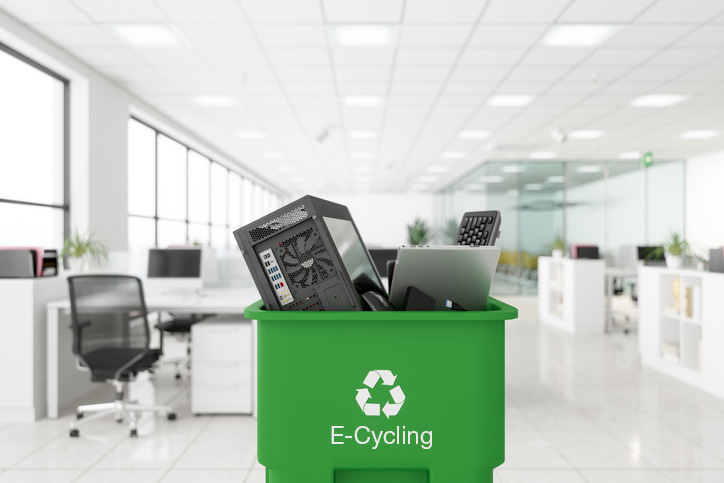Sustainable Solutions: Welcome Eco-Friendly Computer Recycling Services
Sustainable Solutions: Welcome Eco-Friendly Computer Recycling Services
Blog Article
Lasting IT Solutions: Trustworthy Computer System Recycling Provider
In light of this, the requirement for credible computer reusing services has actually never been more vital. In this conversation, we will certainly discover the ecological effect of e-waste, the advantages of accountable computer recycling, how to choose a credible recycling service, the reusing process for computer systems and electronic devices, and the duty of federal government guidelines in e-waste monitoring.
The Ecological Impact of E-Waste
The inappropriate disposal of electronic waste, frequently referred to as e-waste, has considerable ecological ramifications. E-waste describes thrown out digital devices such as smartphones, televisions, and computers (computer recycling). These tools have unsafe materials such as lead, mercury, cadmium, and brominated flame retardants, which can be harmful to both human health and the environment otherwise appropriately taken care of
When e-waste is incorrectly taken care of, it usually ends up in garbage dumps or is incinerated, releasing harmful compounds into the water, air, and dirt. The release of these unsafe products can contaminate groundwater, pollute the air, and contribute to soil destruction, posturing serious wellness dangers to close-by communities and environments.
Moreover, the incorrect disposal of e-waste also adds to the depletion of natural deposits. computer recycling. If correctly recycled, numerous electronic gadgets have valuable metals like gold, silver, and copper that can be recouped and recycled. However, when e-waste is not reused, these important sources are shed, and the demand for new basic materials rises, bring about boosted mining tasks and further environmental destruction.
To alleviate the environmental effect of e-waste, appropriate recycling and disposal approaches need to be employed. This includes the liable collection, taking apart, and recycling of digital tools to recover useful materials and ensure the safe administration of hazardous substances. Applying efficient e-waste management methods is essential to secure the setting, preserve resources, and promote a lasting future.

Benefits of Responsible Computer System Recycling
Effectively recycling computer systems provides a plethora of advantages, including ecological preservation and resource preservation. Responsible computer recycling not only aids protect against digital waste from winding up in garbage dumps, but it additionally lowers the requirement for raw materials and power in the production of brand-new gadgets.
Among the most substantial advantages of responsible computer system recycling is the conservation of the atmosphere. When electronic waste is poorly dealt with, it can release harmful compounds such as lead, mercury, and cadmium right into the soil and water, posturing a danger to ecological communities and human wellness. By reusing computers, these dangerous products can be safely drawn out and dealt with, decreasing the threat of pollution.
An additional advantage is source conservation. Computers consist of valuable materials like gold, silver, copper, and aluminum, which can be recuperated and recycled through recycling processes. By drawing out and recycling these materials, the need for extracting brand-new resources is lowered, conserving natural resources and lowering the ecological effect of resource extraction.
Moreover, liable computer system recycling assists to lower energy intake. Production brand-new computers needs a significant amount of energy, from the extraction of basic materials to the assembly process. By recycling computers and recycling their elements, the energy-intensive production procedure can be stayed clear of, resulting in a reduction in greenhouse gas emissions and a more lasting usage of energy sources.
How to Pick a Trustworthy Computer System Recycling Service
When picking a computer recycling service, it is very important to consider a couple of key aspects to ensure that you select a trustworthy and trustworthy provider. First of all, it is crucial to validate if the recycling service follows proper ecological laws and techniques. A trusted copyright will certainly have qualifications and accreditations that demonstrate their dedication to accountable recycling. Seek qualifications such as R2 (Accountable Recycling) or e-Stewards, which make sure that the recycling procedure meets stringent requirements for environmental security and data safety and security. Secondly, check if the solution uses protected information damage. Data safety and security is a crucial problem when recycling computer systems, as sensitive details stored on old devices can be susceptible to burglary or abuse. A trustworthy recycling solution ought to have safe and secure data damage protocols in position, such as data cleaning or physical damage of storage space devices. Furthermore, consider the solution's record and track record. Search for testimonials or reviews from previous consumers to assess their level of customer fulfillment and integrity. Lastly, think about the service's transparency and accountability. A credible service provider needs to have the ability to provide detailed info concerning their recycling procedure, including how they deal with hazardous products and ensure appropriate disposal. By thinking about these factors, you can select a computer system reusing service that is honest, trustworthy, and eco accountable.
The Recycling Process for Computer Systems and Digital Gadgets
To make certain liable disposal and lessen environmental influence, understanding the reusing process for computer systems and digital gadgets is vital when selecting a reliable recycling service. The recycling procedure for these devices commonly includes a number of stages.
First of all, the tools are collected from people, companies, or drop-off factors. This collection process may entail transportation logistics and safe and secure handling to protect the delicate data had within the devices. As soon as gathered, the tools are sorted based upon their type, such as desktop computers, laptop computers, or mobile phones.
After arranging, the devices undertake an extensive information devastation process to guarantee that any type of personal or sensitive info is permanently gotten rid of. This step is vital to safeguard the privacy and security of people and companies. Data devastation methods may include wiping, degaussing, or physical destruction of the storage media.
Next, the devices are disassembled right into their private components. This permits the splitting up of various materials, such as plastics, steels, and motherboard. These materials are then sent to specialized recycling facilities for additional handling.
The recycling facilities make use of various techniques to extract important products from the electronic waste. These products can be reused or repurposed in the manufacturing of new items. The remaining waste is gotten rid of in an ecologically liable manner, adhering to regulatory standards.
The Duty of Government Regulations in E-Waste Management
Government regulations play a critical duty in the efficient administration of e-waste. With the constant development of the electronic devices market and the boosting worry for ecological sustainability, the requirement for appropriate disposal and recycling of web link electronic waste has become more noticeable. Federal government laws help to make certain that e-waste is taken care of in a sustainable and liable fashion.
One of the main roles of federal government guidelines is to set requirements and guidelines for e-waste monitoring. These guidelines define the proper methods for collection, transport, and recycling of digital waste. By developing these requirements, federal governments can make sure that e-waste is taken care of in a manner that reduces its influence on the setting and human wellness.
This includes implementing take-back programs, where suppliers are liable for gathering and recycling digital waste from customers. These regulations assist to move the concern of e-waste administration from the specific consumer to the market, ensuring that electronic waste is taken care of in a more sustainable fashion.

Conclusion
In verdict, it is important to take into consideration the ecological impact of e-waste and pick a reliable computer system recycling service to responsibly take care of digital tools. By complying with federal government guidelines and involving in correct reusing processes, we can alleviate the adverse impacts of e-waste on the environment and advertise an extra lasting future.
In this discussion, we will check out the environmental impact of e-waste, find out here now the benefits of accountable computer recycling, how to choose a credible recycling solution, the recycling process for computers and digital devices, and the role of government policies in e-waste management. Computers consist of useful materials like gold, copper, aluminum, and silver, which can be recouped and reused with reusing procedures.Moreover, liable computer system recycling helps to reduce power usage. Data security is an important problem when reusing computers, as delicate details stored on old devices can be at risk to theft or abuse. By taking into consideration these variables, you can select a computer reusing solution that is moral, trustworthy, and ecologically liable.
Report this page